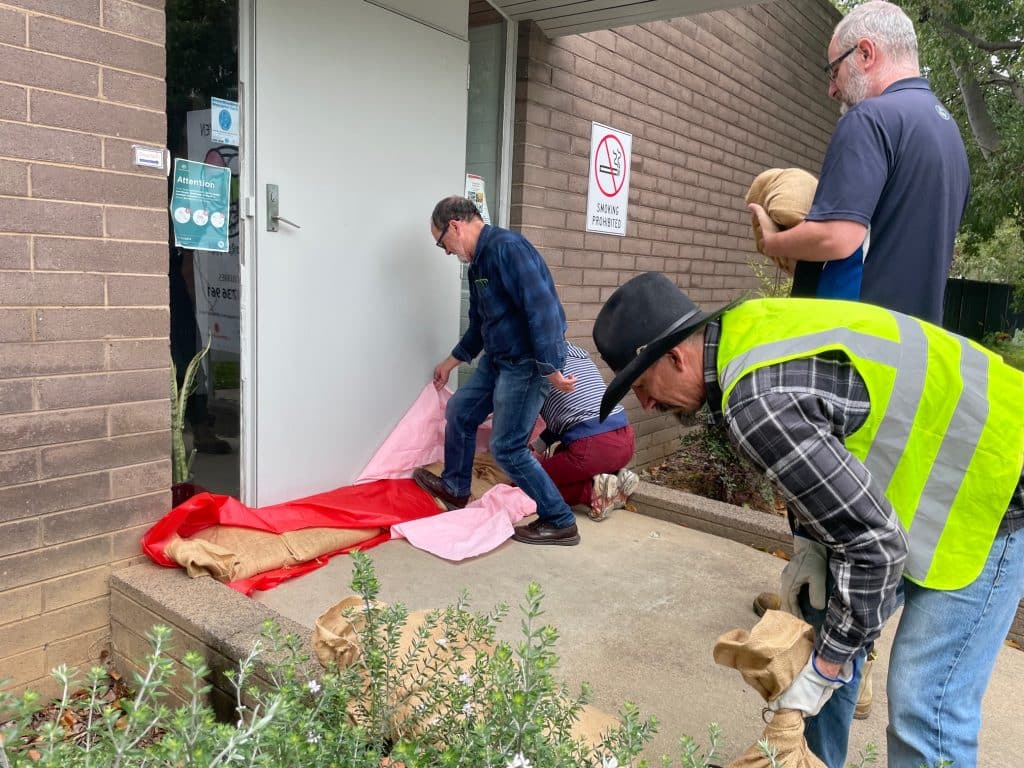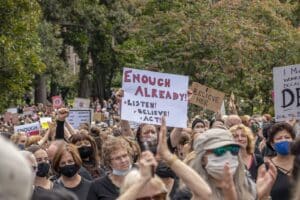
Jenan Taylor
7 September 2023
Anglican churches are working to help communities recover from floods that hit central Victoria in 2022 as many people remain traumatised.
The towns of Rochester and Mooroopna experienced some of the worst inundation during October’s catastrophic rain event. Flood waters damaged infrastructure, land, residences, and the local economy.
The flooding displaced residents, and led to hundreds of people seeking help from mental health services for conditions including depression, anxiety and suicidal ideation.
Anglican church representatives in Rochester and Mooroopna say addressing the recovery of individuals and communities has become a major focus for them.
Rochester community chaplain Samuel Kelly said more than 90 per cent of the town’s residences and businesses were affected by flood waters.
Read more: Call for donations for flood-hit churches to help communities
Mr Kelly said they faced multiple problems since then, including struggles with insurance companies and getting assistance with rebuilding. He said many people were still living in tents and caravans because of that.
Mr Kelly was one of several community chaplains Bendigo diocese appointed to the town after the Holy Trinity church building was flooded, and became unusable.
Even 11 months after the floods, people’s thoughts and conversations remained preoccupied with what had happened and whether they would get back on track, Mr Kelly said.
He said because of the on-going delays especially around repairs to their houses, many people were yet to enter a recovery phase.
Mr Kelly said if the situation continued, there could be a huge toll.
“It’s recurring trauma for people, as every time they have to deal with a contractor or insurance company, it aggravates those feelings of 12 months ago when [the flood] happened,” he said.
St Alban’s Mooroopna priest the Reverend Simon Robinson said almost a year on from the devastating floods, the town seemed to be emptying.
Read more: ‘Gift from God’ church escapes central Victorian floods
Mr Robinson said continuing setbacks with insurance claims and repairs, and business closures, were driving many individuals and families to leave that part of Greater Shepparton altogether.
He said there were about 100 properties in town that were waiting to be assessed, and that people were living in caravans or couch surfing out of town while they waited.
But the efforts of many individuals to get their plight recognised, seemed to not be going anywhere, Mr Robinson said.
He said this, combined with cost-of-living battles, made many people feel that they didn’t matter to decision makers.
Mr Robinson said ministering to the affected community members was hard, and that many of the conversations he struck up with people were one-off because so many of them left town.
He said St Alban’s church members provided huge practical support to the community during the floods and in the immediate aftermath. Now, they were plugged into community advocacy roles.
He said he and some church members had joined the local flood recovery committee, and some were advocating on behalf of some community members for insurance assistance.
Mr Robinson said they also hoped to join a new emergency committee to advocate for better emergency preparedness and better communications from local decision-makers.
Despite the broader community’s battles, the church’s congregation was actually stronger than ever, he said.
Only one parishioner’s house was affected by the flood waters, and no members had joined the community exodus.
Mr Robinson said there had been an influx of people to the church on the back of the COVID pandemic.
“They were people looking for answers, and they’ve stayed. And the Holy Spirit keeps bringing people through the door. They find hospitality and for some, the liturgy and music gives them a buzz. But it’s the people and the relationships they like,” Mr Robinson said.
Read more: Pastoral carer training seeks to help tackle climate change trauma
Mr Kelly said as much as the flood disaster had devastated the community, it also helped reignite their community spirit.
He said it had made people who were forced apart by COVID restrictions come together to help one another. In Rochester, that included decision-makers making an effort to work with local people to find a way forward.
Mr Kelly said even though Holy Trinity Rochester members travelled to a town 20 minutes away to attend a physical church, some continued to run their church groups locally.
He said Holy Trinity ladies’ group met at different cafes around Rochester every month.
“They decided it was a way to help those cafes keep going, support the local community, and keep their connections with each other at the same time,” Mr Kelly said.
He said Anglicans outside the area who wanted to help out, could visit the affected towns during their holidays and support tourist and hospitality efforts.
For more faith news, follow The Melbourne Anglican on Facebook, Instagram, or subscribe to our weekly emails.






